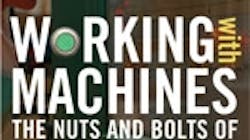As automation proceeds more and more of the routine production work assumes the nature of maintenance," observes lean consultant Michel Baudin in his latest book. Look to the man-machine interface as a fundamental competitive tool, he observes. At that interface the production and maintenance strategies determine success. In the broadest sense, manufacturing competitiveness is determined by Jidoka -- how people work with machines.
Baudin maintains that effectiveness in the use of production machines is rarely limited by their technology -- even outside of leading-edge plants in high-tech industries or mature industries introducing new technology. He stresses the inherent technical capability of machines to hold the required tolerances. His point: The performance differences observed between factories result from the way people use their machines, including maintenance of the equipment.
Baudin's discussion begins with the human interface of the individual machines and progresses toward the linking of machines into cells, as well as the management of "monuments" and common services, automation, maintenance and production control.
He concludes that monuments are "not desirable and that the common services departments running them should be shrinking over time. [But] as long as common services exist, however, like every other part of the plant, this department must be designed, operated and improved." (Regarding monuments, he contrasts a spectrum of practices ranging from a rolling mill to an electroplating shop to Toyota's Global Body Line.)
Baudin sees TPM (Total Productive Maintenance) as a means to resolve traditional maintenance challenges.
See Also
